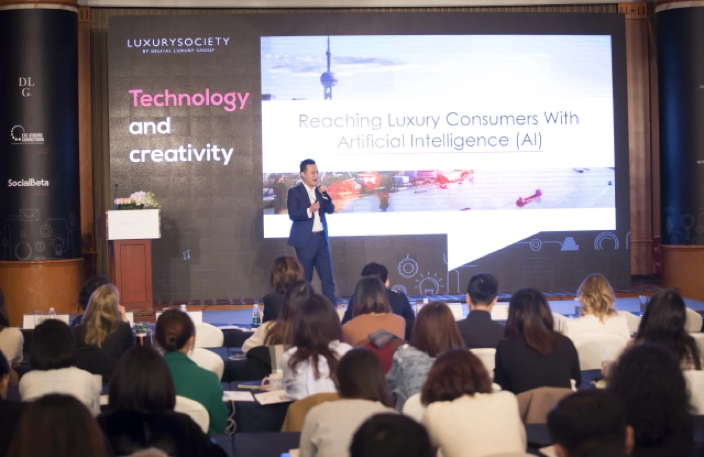
The third annual Luxury Society Keynote covered Millennials, artificial intelligence and advertising on WeChat.
SHANGHAI — It’s rare to see presentations from Chinese tech giants Alibaba, Tencent, Baidu and Weibo in one afternoon, but that is exactly what the audience of international luxury brand representatives saw Wednesday at Shanghai’s Four Seasons Hotel.
The Luxury Society Keynote is an annual conference focused on new ways luxury brands can engage with technologies within China’s unique digital infrastructure.
The ever-multiplying options for using WeChat for marketing and advertising purposes were outlined by Max Ren, senior product manager for WeChat advertising and Tencent social advertising, while Alibaba’s new e-commerce options for luxury brands, including the app-in-app platform known as the Luxury Pavillion, which launched earlier this year, was covered by Tmall luxury business solution director, Persephonie Zhu.
Sina Weibo, a social media platform that has managed to rocket back to relevancy in recent years due to an explosion of celebrity and influencer culture in China and the addition of embedded live-streaming and video technologies, presented best practices for brands utilizing its platform by working with third-parties.
Join Luxury Society to have more articles like this delivered directly to your inbox
Search giant Baidu has become a world leader in artificial intelligence technology in recent years and senior key account director Charly Cai, who is responsible for Baidu’s luxury and cosmetics industries portfolio, outlined the future of AI technology, particularly in relation to the online to offline luxury retail experience.
“Think about waking up in the morning, looking in the mirror and having your mirror tell you about the weather and your schedule, then you order your auto-pilot car to pick you up from your door and drop you at work. We will be surrounded by all these smart devices, not just smartphones. All the information in the future will be connected between online and offline,” Cai said.
“Baidu’s key innovation recently has been our facial recognition data, which has almost 100 percent accuracy[...]A facial recognition mirror in a beauty store can recommend colors that suit you or recommend the best products to suit you based on your face and skin type.”
Baidu has already collaborated with brands including Dior and Louis Vuitton on marketing efforts that utilize these technologies. When Louis Vuitton launched their first fragrance line in China in August, an occasion which also marked the brand’s first push into Chinese e-commerce, Baidu selected seven celebrities to coincide with each of the seven fragrances.
Users were able to interact with the facial recognition technology by uploading selfies and Baidu’s AI technology matched them with the celebrity that coincided with their “ideal” scent.

Image: Baidu's Charly Cai talks artificial intelligence at the Luxury Society Keynote in Shanghai.
So much of digital marketing is targeting Millennial consumers, but this group is still little understood or defined, said Digital Luxury Group’s Pablo Mauron, who presented a case study of his firm’s work with Montblanc in China.
“The one thing we know for a fact is that we will find them online, and they want to look and feel different. This raises a tricky question for luxury brand, which are built on the idea of exclusivity and scarcity. With e-commerce, which proposes to make every product available all the time, how do you still develop that feeling of scarcity?” he asked.
According to Mauron, the answer is in crafting a feeling of urgency through digital marketing and e-commerce, with messaging that feels ephemeral, authentic, raw and spontaneous.
“As a luxury brand we want more the feeling of emergency, the feeling that I need to get it now or I might miss out. This leads to feeling that you are cool enough to get it at the right time, before everyone else, rather than just, I can buy it before I can afford it. It’s a feeling of pride to be part of something, rather than just owning something,” Mauron said.
Article originally published in WWD. Republished with permission.
Cover image credit: Luxury Society. Image: Persephonie Zhu | Luxury Business Solutions Director, Tmall, Alibaba Group

